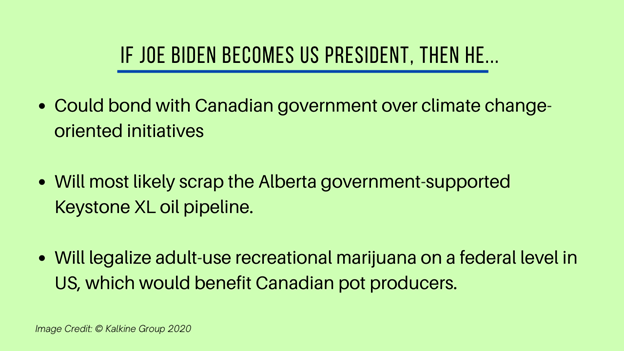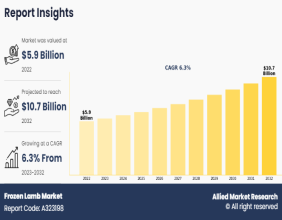image source: joebiden.com
Summary
- With the US Presidential elections 2020 right around the corner, Canada is gearing up for likely impacts.
- Democrat candidate Joe Biden has proposed a US$ 2-trillion investment into reducing America's carbon footprint for the next four years, which aligns with the Canadian government’s climate change efforts.
- Biden has also promised federal legalization of recreational cannabis, which would benefit Canadian marijuana producers greatly.
- However, Biden’s alternative energy approach would harm Canada’s oil and gas industry. He has already spoken about scrapping Trump’s permit for the Keystone XL pipeline project if he comes to power.
With the United States Presidential elections 2020 right around the corner, Canada too is gearing up for likely impacts.
However, the impact of Joe Biden becoming the US president will be substantial on Canada and its economy.
Counting of votes is set to begin on November 3 for the 2020 US presidential elections.
Democrat candidate Joe Biden has proposed a US$ 2-trillion investment into reducing America's carbon footprint for the next four years, which aligns with the Canadian government’s climate change efforts.
Biden has also promised federal legalization of recreational cannabis, which would benefit Canadian marijuana producers greatly.
However, Biden’s alternative energy approach is not exactly in tandem with the Canadian oil and gas industry. He has already spoken about scrapping Trump’s permit for the Keystone XL pipeline project, if voted to power.
With the United States Presidential elections 2020 right around the corner, Canada too is gearing up for likely impacts. Most recent polls have shown Democratic candidate Joe Biden to be in the lead against current US President Donald Trump. Even three-fourth of the Canadian population want Biden to come into power in the White House, claim some recent studies.
However, the impact of Joe Biden becoming the US president will be substantial on Canada and its economy. His promised clean energy initiatives and, not to forget, the ‘Buy American’ campaign will have a cascading effect on the Canada-US trade relations. And as the economy and trade faces fluctuation, the stock markets will also feel some impact.
BIDEN'S CLEAN ENERGY PLANS VS CANADA’S OIL AND GAS SECTOR
Since the Obama regime, Joe Biden, as his vice president, has been vocal about climate change issues and his support for eco-friendly clean energy alternatives. During his presidential campaigns, Biden took a step further and proposed a US$ 2-trillion investment into reducing America's carbon footprint for the next four years. This, on one hand, resonates with the Justin Trudeau government's ideals. The Canadian government's environment-oriented initiatives, which took a backseat during the Trump regime, could likely come in the forefront again if Biden comes to power.
However, Biden's ambitious climate change-fighting proposals could mean bad news for Canada's oil and gas industry as well. Canada, as the world's fourth largest natural oil and gas producer, exports a major portion of its production down south to the United States. In the likely scenario that Biden's plans to "transition from the oil industry" comes into action, Canada's crude oil industry could be in trouble in terms of trade.

During his campaigns, Biden has repeatedly stressed on scrapping the permits of the Alberta government-supported Keystone XL oil pipeline. The extended pipeline, which is supposed to run between Alberta and Nebraska in the United States, has had many hiccups in the past. At first, former president Barrack Obama postponed the project in the wake of protests by environment activists. When Trump took over the Oval Office, he green-lit it in January 2017. Now, if Democrat Biden comes to power, it is likely that the Keystone XL project will hit the back burner again, which wouldn't be good for Canada’s oil and gas industry.
CANADA-US TRADE UNDER BIDEN'S REGIME
The world has seen and felt the impact of escalating tension in global trade, especially between China and the US. Political experts believe that if Biden becomes US president, he will work at getting back some amount of harmony. Also, the reimposition of 10 per cent import tariffs on Canadian aluminum that the Trump regime has levied on the country could also be subject to change if Biden takes over.
However, the former US vice president has spoken about raising corporate tax rates in the country. This could make Canada a more lucrative field in terms of diverting foreign investments.
As an importer of 75 per cent of its goods exports, Canada relies majorly on its trade with the US. Hence, a potential downside of a Biden regime for Canada could be his highly promoted 'Buy American' economic campaign, which includes an investment of a whopping US$ 400 billion into American-manufactured products.
Both the countries recently entered a tri-accord agreement with Mexico. The Canada-United States-Mexico Agreement (CUSMA), the successor to the trillion-dollar North American Free Trade Agreement (NAFTA), was enforced earlier this year. This trade deal will regulate commercial transactions between the three nations worth US$ 1 trillion.
CANADA’S CANNABIS MARKET EXPANSION TO US UNDER BIDEN
Entering the US market has been the dream for Canadian recreational cannabis producers for long. But as of now, the US does not allow adult-use recreational marijuana on a federal level.
In the beginning of the US presidential race for 2020, former Democrat candidate Bernie Sanders had promised to bring in the bill for cannabis legalization on his first day in the Oval Office. Even after Sander’s exit from the poll race, the topic of marijuana federal legalization has been a hot one, especially at the Democrat campaigns.
Democrat vice presidential candidate Kamala Harris has openly promised the legalization if she and Joe Biden are elected to the White House. Cannabis stocks saw a noticeable boost in October after Harris made this announcement.
While Biden’s presidency could mean a boost of Canada’s cannabis industry and clean energy initiatives, it could mean bad news for the country’s oil and gas producers. However, as countries which are greatly interdependent on each other, Canada and the US will have to make the best of whatever end result comes from the 2020 presidential elections.




